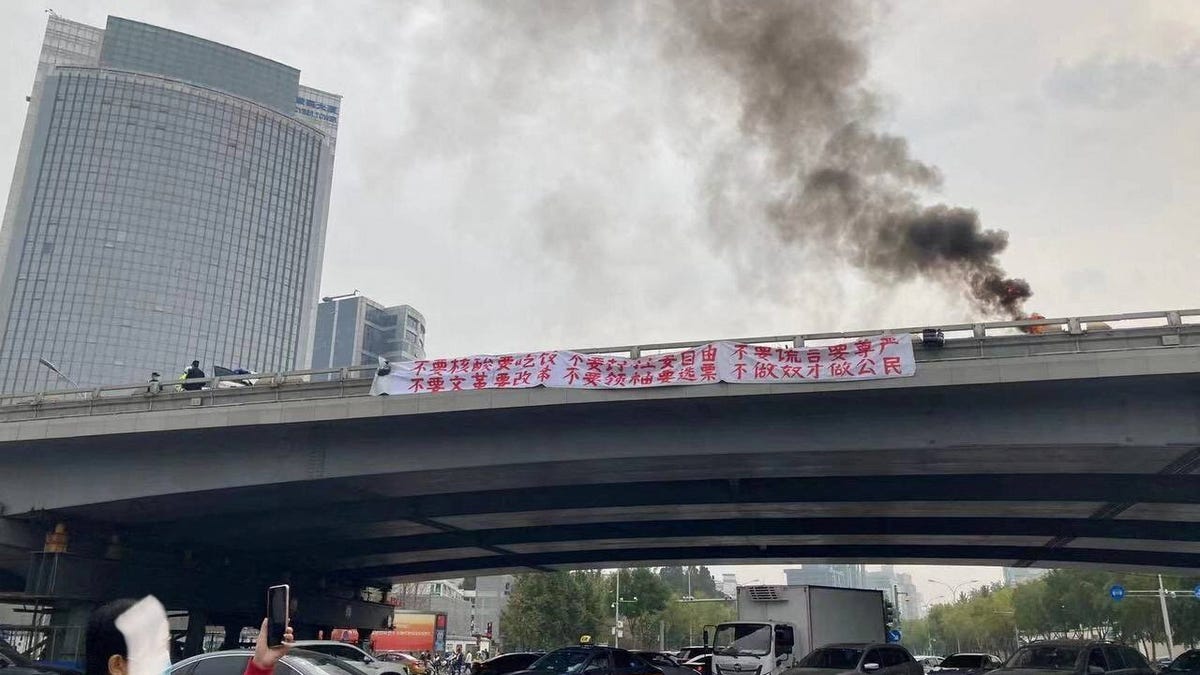
Daily News | Online News
Chinese authorities have censored a rare protest in Beijing that took place just days before Sunday’s convening of the 20th Party Congress, a pivotal twice-a-decade meeting where president Xi Jinping is expected to cement an unprecedented third term as the nation’s leader.
Photos and videos circulating online show that two red-character banners were unfurled over the railing of an overpass in Beijing’s Haidian district on Thursday (Oct. 13), criticizing the country’s strongman leader and ongoing covid restrictions.
“Go on strike at school and work, remove dictator and national traitor Xi Jinping,” said one banner in an unusually direct address, while the other read: “We want food, not PCR tests. We want freedom, not lockdowns. We want respect, not lies. We want reform, not a Cultural Revolution. We want a vote, not a leader. We want to be citizens, not slaves.”
Videos show police removing the banners, and some images seem to indicate the protester was taken by authorities, although there has been no official confirmation of an arrest. Censorship has also moved online, with posts containing words like “Beijing,” “brave,” and “bridge” being removed as the Chinese government seeks to rein in the national conversation during a time of heightened political sensitivity.
Dissent against both CCP officials and institutional corruption is far from rare in China—but this demonstration is markedly close, physically and temporally, to the Party Congress. Overt criticisms of Xi himself are also rare. It comes at a time when China’s zero-covid restrictions, tanking real estate market, and tech sector slump are taking a heavy economic toll.
The incident also holds deeper implications for China’s state-society relations. Since China embarked on its path of “reform and opening up” about four decades ago, Beijing has carefully maintained a de facto social contract—the people reap the benefits of economic prosperity, while the CCP holds a monopoly on political power. As China’s economy has slipped, that contract has come under strain, and as the recent protest indicates, is starting to crack.
Covid’s impact on China’s economy, by the digits
2.8%: The World Bank’s projection for China’s growth in 2022, down from 8.1% in 2021
$40 billion: Domestic tourism spending over China’s Golden Week holiday in 2022, down by more than half compared to pre-pandemic levels
30%: Predicted fall in new property sales for China in 2022
7%: China’s export growth in August year-on-year, far lower than analyst predictions and a steep contraction from July’s 18% growth
3%: Decline in quarterly year-on-year revenue in August for Chinese tech giant Tencent, its first-ever reported fall in sales
Quotable
“Fighting against the epidemic is both a material struggle and a spiritual confrontation. It is a contest of strength and a contest of will. We will not waver.” –A statement published in the People’s Daily on Oct. 11 affirming China’s commitment to its zero-covid policy. Translation from The Washington Post.
Brief timeline of censorship under Xi (2013-present)
2014: China censors several American TV shows, including The Big Bang Theory and NCIS.
2016: China bans what it deems “vulgar, immoral, and unhealthy content” from screens, including depictions of gay people, extramarital affairs, and reincarnation.
2017: The Ministry of Industry and Information Technology announces an internet “cleanup,” including a crackdown on VPNs, which allow netizens to access content outside of the so-called “Great Firewall.”
2018: China bans images of Winnie the Pooh following the release of the film Christopher Robin when memes compare the cartoon bear to president Xi Jinping.
2018: The CCP proposes lifting the two-term limit on presidencies, and phrases including “I don’t agree” and “election term,” and even the letter “N” are censored online.
2020: Demands for freedom of speech online are censored following the death of Dr. Li Wenliang, who was silenced after giving an early warning about the disease outbreak in Wuhan.
2021: China censors an article written by former premier Wen Jiabao about his late mother in the Macau Herald, likely for stepping outside the party line.
2021: All mention of Chinese billionaire actor Zhao Wei (Vicky Zhao) is removed from social media and streaming platforms amid a crackdown on celebrities.
Related stories
🤒 China’s covid testing is punishing the poor while creating new billionaires
📉 How worried is China about the tumbling yuan?
🙈 China’s internet censors have a blindspot: Cantonese

0 Comments :
Post a Comment